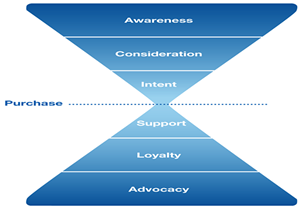 I received an invite to CrowdFactory’s “Driving Social Media & Customer Acquisition Throughout the Customer Lifecycle” webinar yesterday with Jeremiah Owyang from Altimeter Group and Sanjay Dholakia, CEO of CrowdFactory and decided to liveblog it.
I received an invite to CrowdFactory’s “Driving Social Media & Customer Acquisition Throughout the Customer Lifecycle” webinar yesterday with Jeremiah Owyang from Altimeter Group and Sanjay Dholakia, CEO of CrowdFactory and decided to liveblog it.
Jeremiah has pioneered a lot of the social media thinking found in progressive companies today and his blog, Web Strategist, is known to senior business and agency marketing executives world-wide. I’ve been reading it for many years. This webinar addressed several key issues from a social engagement and commerce perspective and promised to share how marketers are using social media to engage customers and prospects across the entire lifecycle.
Customer acquisition isn’t a just a linear path through a sales funnel any more. Social engagement and sharing opportunities exist wherever content is published, interactions and brand/consumer communications occur. Realizing how to incorporate social elements to facilitate engagement and sharing helps brands extend their reach and enlist customers to advocate for them.
Sanjay opened things up stating that driving engagement is essential throughout the customer experience, not just at the top of the funnel. Crowd Factory provides software that facilitates social promotion and engagement of all marketing content.
Jeremiah shared that when marketers come to the table, they often apply social media efforts in a piecemeal way. It’s important to involve the entire customer lifecycle and to think about the entire customer journey.
Altimeter asked 140 social strategists: What 3 go to marketing social strategy objectives will you focus on most in 2011? Responses were led by Website Integration (46.7%), followed by Ongoing Dialog with Customers (43.4%) and Listening/Learning About Customers (37.7%)
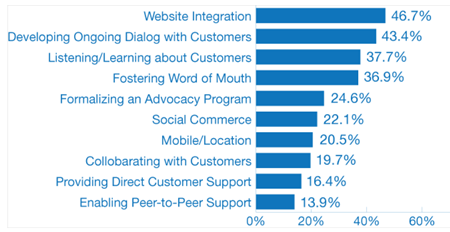
Source: Altimeter Group
The Customer Hourglass Framework
The challenge is that companies continue to build tactics in silos. Public Relations, Branding, Ecommerce and other groups might be building different social experiences for the same brand. These individual efforts result in an incomplete customer experience.
The traditional purchase funnel is outdated. Think about how we can use that funnel to be more effective, ala “Flip the Funnel” (Joseph Jaffe). The Customer Hourglass is a model for this alternative thinking and looks at the entire customer experience: Awareness, Consideration, Intent, Purchase, Support, Loyalty, Advocacy. Jeremiah’s presentation explores each of these brand and customer experiences as it relates to social media.
Awareness: Customers & prospects may not know who you are, so the goal is to become top of mind. A great example: AmEx OPEN Forum surfaces small business owner discussions and networking opportunities. This community enables small business owners to connect with each other and gain insights and expertise from thought leader contributed content.
Awareness Key Takeaways:
- Expect paid media such as advertising to fuel the Awareness phase
- Often rely on content about lifestyle and pain points of customers
Consideration: It’s about letting customers advocate for you. Leverage your customer’s content. Example: Epson has included customer reviews. Visitors who interacted with reviews were 67% more likely to convert. They also had a 25% higher average order value. The downside of other people’s content is you lose control.
Consideration Takeaways:
- Repurpose your product inventory information an apply it to the real world
- Aggregate 3rd party reviews to your corporate website
- Repurpose your reviews on your corporate website to 3rd party websites and blogs: extend and repurpose
Intent: Customer interactions with ecommerce content provides opportunities to share their intent with relevant networks. Example: Levi’s incorporates the “Like” button. Shoppers can “Like” and post comments about products straight to their Facebook wall. Customers see an instant shopping cart based on previous friend’s “Likes”. The caveat is that the data isn’t always correct, but is improving. Levi’s isn’t sharing performance numbers but they’re continuing this activity, so something is happening for them to warrant continued investment.
Intent Takeaways:
- While still emerging, social features are fueling sales efforts by adding richer context to the customer experience
- Expect next gen apps to pre-populate wish lists and shopping carts
Purchase – Tapping into friends at POP (point of purchase). This is where to connect with customers at the point of decision in the ecommerce experience. An example is Facebook launching group buying deals. Another is Sony using group buying incentives to promote an album launch (Britney Spears). If a visitor got 5 friends to pre-order they all get 20% off. Sony reports a 50% traffic bump at launch.
Purchase Takeaways:
- Social features allow friends to share point of purchase with others
- WOM (word of mouth) can be measured and attributed to individuals
- Expect in the future that virtual currency or virtual goods will offer consumers discounts or exclusive deals
Support: Using these technologies to encourage customers to have a great experience. Example: Wells Fargo – @askwellsfargo is used to listen to customers and offer assistance. In the regulated space there are important concerns around privacy, so conversations are often taken to private chat or channels. Q/A tools, forums and similar applications can be used to encourage customers to support each other.
Support Takeaways:
- Reduce support costs by giving information to consumers on hand
- Use a tiered approach” load up FAQ first. Follow up providing the ability for them to conduct peer to peer support. Provide them with direct to company support when the first 2 avenues have been exhausted
Loyalty: The social application to this phase extends to multiple areas. Example: Hilton developed a mobile application “Top Guests”, which is basically a white label version of Foursquare for the hospitality industry. HHonors members can give a Facebook friend 25% off Doubletree B&B reservation once they check in.
Loyalty Takeaways:
- Loyalty programs of the past are based on long term commitment and total potential spending value
- In the future, companies will factor in game mechanics, badging
Advocacy: Another phase that extends to multiple areas, involves enabling customers to serve as brand ambassadors. Example: TurboTax Inner Circul uses a community management tool.
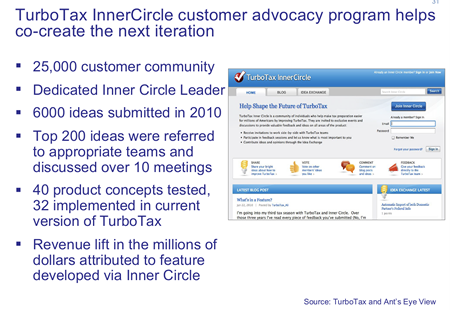
Another Advocacy example is Microsoft MVP – Most Valuable Professional. Every year 4,000 MVPs are nominated by peers, employees, and other MVPs then selected by an internal panel. Term of service is 1 year. It gets customers to do the work of evangelizing the brand.
Advocacy Takeaway:
- The holy grail of marketing, this is the lowest cost of acquisition, most effective marketing
Summary: Remember that customers are behaving in new ways, in new places and have new expectations. Think beyond the silos.
Sanjay asks: Where do customers spend their time?
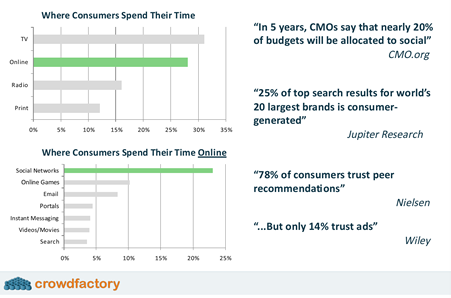
There are a number of social applications and tactics social media marketers use to engage customers online including:
- Sweepstakes
- Special Offers
- Social Shopping
- Viral Video
- Media Boost
- Share Stories
- Wishlists
- Ratings & Reviews
- Badging
Channels used to deploy these applications and tactics include: Website, Facebook, Display Ads, Mobile, Landing, Email. These tactics and channels extend across the customer lifecycle.
Marketers can create the ability during the ecommerce experience, to engage with social network friends (Facebook) for opinions. An example is the Rachel Ray website where customers can tap into their Facebook network during the purchase experience for advice.
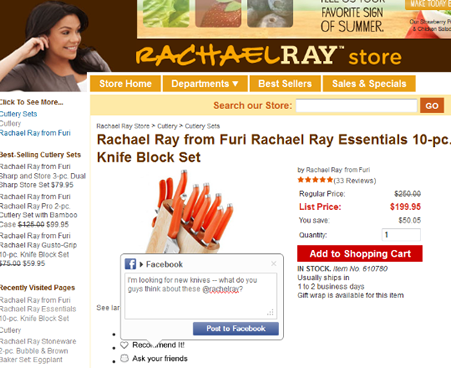
Tips on engaging customers throughout the lifecycle:
- Fuel the top of the funnel (awareness) with paid media
- Identify intent through social action
- Offer the option to share your purchase event on the ecommerce thank you page – give them an incentive
- When customers rate your content, encourage them to share that activity with their social networks
- Drive loyalty with earned prizes and status
- Call to arms – encourage fans to come together to reach a particular goal – game, recognition
- Drive advocacy through story telling – encourage customers to tell & share their stories
Social data across the lifecycle is critical to success. Think about social as an “Add-in” or extension to what you are already doing at each stage – not a separate thing. (I would recommend SEO and Social Media Optimization in the same way).
Use the right social engagement for the right touch point – all from a single place so you have a common set of data about your customers. Use analytics and real-time feedback to determine what works and what doesn’t.


